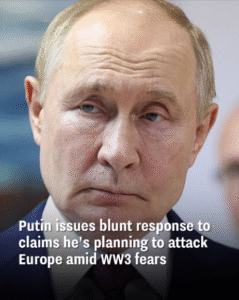The Blunt Denial: Putin’s Response and the Theater of Global Fear
On September 3, 2025, Vladimir Putin stood beside Slovakian Prime Minister Robert Fico and delivered a statement that reverberated across Europe. The setting was diplomatic, the tone was sharp, and the message was unmistakable: “As for Russia’s aggressive plans with respect to Europe, I want to emphasise once again that this is complete nonsense, which has absolutely no basis”.
It was a blunt response to a growing chorus of concern. European governments, rattled by Russia’s continued occupation of Ukraine and its deepening ties with China, had begun bracing for what some feared could be a broader military escalation. France instructed hospitals to prepare for a “major” conflict by March 2026. Germany placed its forces on alert. NATO’s posture stiffened.
And Putin? He called it hysteria.
🧠 The Psychology of Denial
Putin’s words weren’t just a denial—they were a performance. A calculated rejection of a narrative that paints Russia as a looming aggressor. By calling the claims “provocation or incompetence,” he reframed the conversation: not about what Russia might do, but about what Europe is imagining.
This is classic Putin. He doesn’t just reject accusations—he ridicules them. He turns fear into farce. And in doing so, he asserts control over the narrative.
But beneath the bravado lies a deeper tension: the gap between what Russia says and what it does.
🔥 The Context of Escalation
Putin’s statement came amid a swirl of geopolitical anxiety. The Middle East was boiling over. Iran and Israel were locked in a dangerous spiral. President Donald Trump, now in his second term, had recently met with Putin in a historic but strained summit. The Alaska Summit, as it’s now called, was meant to cool tensions. Instead, it exposed them.
Trump had set deadlines for peace in Ukraine. Putin ignored them. Russia ramped up strikes on civilian targets. A U.S. factory in western Ukraine was destroyed. The Kremlin refused bilateral talks with Ukrainian President Volodymyr Zelenskyy. And Dmitry Medvedev, Russia’s Deputy Security Council Chairman, engaged in a war of words with Trump online—one that ended with the U.S. deploying nuclear submarines.
In this climate, Europe’s fears weren’t unfounded. They were reactive. Defensive. And deeply human.
🧭 The China Factor
Putin’s denial also came while attending a military parade in Beijing, where Chinese President Xi Jinping welcomed him as an “old friend.” The symbolism was potent. Russia and China, once wary neighbors, now stood shoulder to shoulder—militarily, economically, ideologically.
Putin praised the relationship, calling it “unprecedentedly high”. For European leaders, this alliance added another layer of concern. A Russia emboldened by Chinese support is a different kind of threat—less isolated, more confident, harder to contain.
And while Putin smiled for cameras in Beijing, European capitals braced for impact.
🕊️ The Language of Reassurance
Putin’s statement was designed to reassure. “Any sensible person realises that Russia has never had, does not have, and will not have the desire to attack anyone,” he said.
But reassurance from Putin is a paradox. His words often contradict his actions. His denials are often preludes. And his definition of “sensible” is uniquely his own.
Still, the statement matters. It’s a line in the sand. A declaration that, if broken, will carry consequences—not just for Russia, but for the fragile balance of global order.
🔍 The European Response
Europe is listening—but not relaxing. France’s military hospitals are preparing for mass casualties. Germany’s Chief of Defense, Carsten Breuer, has stated that NATO forces are on alert. While he doesn’t anticipate a direct attack on NATO territory, he acknowledges the risk posed by Russia’s military base in Belarus.
This is the new normal: a continent on edge, responding to signals, interpreting silences, preparing for what may never come—but could.
And in this atmosphere, every word from Putin is a chess move.
💡 What We Learn
From Putin’s blunt response, we learn that denial is a tool. That rhetoric can be both shield and sword. That in geopolitics, what’s said is often less important than who’s listening—and how they interpret it.
We learn that fear is contagious. That hysteria, as Putin calls it, may be rooted in history, not imagination. That Europe’s reaction is not just about Ukraine—it’s about centuries of conflict, betrayal, and survival.
We learn that alliances matter. That Russia’s embrace of China shifts the global axis. That diplomacy is theater, and every actor plays to a different audience.
And we learn that peace, when promised by a man at war, is a fragile thing.
🧵 The Thread of Uncertainty
Putin’s statement may calm some. It may enrage others. But it doesn’t resolve anything. The war in Ukraine continues. The threats linger. The alliances harden.
And beneath it all is a thread of uncertainty—one that stretches from Kyiv to Paris, from Washington to Beijing.
It’s the thread that ties together every headline, every speech, every deployment.
And it’s the thread we must watch.


